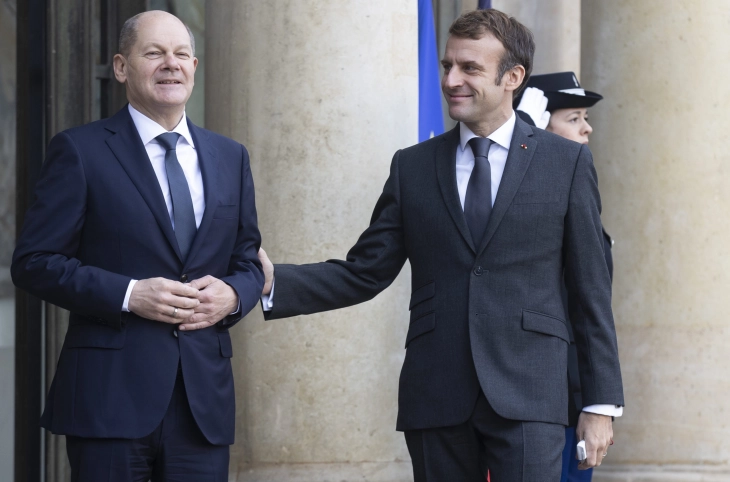Scholz, Macron and Tusk stress unity and greater support for Ukraine
- The leaders of Germany, France and Poland insisted they were united in their support for Ukraine at a summit in Berlin on Friday, but did not address a much-debated question about whether European troops would be sent to fight in the war zone.
- Post By Magdalena Reed
- 20:39, 15 March, 2024

Berlin, 15 March 2024 (dpa/MIA) — The leaders of Germany, France and Poland insisted they were united in their support for Ukraine at a summit in Berlin on Friday, but did not address a much-debated question about whether European troops would be sent to fight in the war zone.
"All three of us are serious about our support for Ukraine," German Chancellor Olaf Scholz said on Friday following consultations with French President Emmanuel Macron and Polish Prime Minister Donald Tusk.
"More than ever, our unity is our strength. And our three states, Germany, Poland and France, have a special responsibility in this regard," said Scholz.
Macron said the three countries remain "united and energized" when it comes to supporting Ukraine. "We share one conviction: Ukraine is about our security and our future."
The leaders had spoken "with one voice," Tusk said at a joint press conference with the other two leaders from the so-called "Weimar Triangle," a grouping founded in 1991. He agreed that the "security of our continent" was at stake.
All three NATO countries are supplying Ukraine with weapons for its fight against the ongoing Russian invasion.
Scholz and Macron, however, have clashed recently over Macron's remarks that left open the possibility of future deployments of NATO combat troops to Ukraine.
Neither leader addressed the issue on Friday.
Macron again told French television on Thursday that leaders should consider all options to deter Russian President Vladimir Putin - including the possibility of sending combat troops to Ukraine.
Scholz has categorically rejected that possibility amid concerns of escalating the conflict.
"Both have their points of view and they will stick to them," Scholz's spokesman, Steffen Hebestreit, said just a few minutes before Scholz received the French president with a handshake - but no hug - on the red carpet in front of the Chancellery in Berlin.
Scholz did however talk about sourcing more weapons for Ukraine.
He pledged that more weapons would be procured for Ukraine with immediate effect - "on the entire world market."
Critics have alleged that European efforts to supply Ukraine with armaments have been hindered by a focus on buying from domestic European producers.
The German chancellor also said that the production of military equipment will be expanded in cooperation with partners in Ukraine and that a new coalition to supply Ukraine with long-range missiles would be established.
Scholz said that aid for Ukraine paid for through the European Union would be increased, and that European countries would use revenues from frozen Russian assets to fund further weapons purchases.
Tusk, for his part, said the three countries were ready to provide whatever was needed to make sure the situation in Ukraine improved rather than deteriorated in the next weeks and months.
Poland, which borders Ukraine, is an important hub for military aid from the West and has taken in almost 1 million refugees from its eastern neighbour.
The Weimar Triangle dialogue group was founded in August 1991 by the then foreign ministers Hans-Dietrich Genscher, Roland Dumas and Krzysztof Skubiszewski in Weimar, Germany.
The format initially sought to bring Poland and other Eastern European states closer to the European Union and NATO. While that has since become less of a concern, the group started meeting more frequently after Russia launched its full-scale invasion of Ukraine over two years ago.
The three met in February 2022 and then again on the sidelines of the Munich Security Conference in February 2023.







